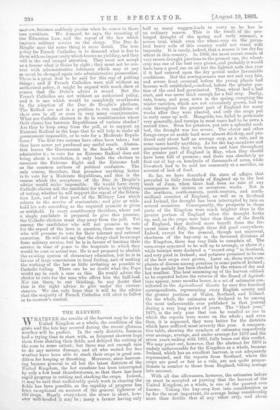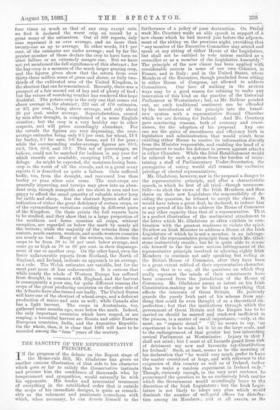THE HARVEST.
WHATEVER the results of the harvest may be in the United Kingdom as a whole, the condition of the grain and the late hay secured during the recent glorious weather will be perfect. In the early districts, farmers had a trying time to start with, as frequent showers kept them from clearing their fields, and delayed the cutting of the corn to some extent ; but there was not enough rain to do any serious damage, and all who waited for fine weather have been able to stack their crops in good eon- dition for keeping or threshing. Moreover, since harvest- ing became general in all but the latest districts of the United Kingdom, the hot sunshine has been interrupted by only a few local thunderstorms, so that there has been rapid progress in cutting and stacking the crops, Indeed, it may be said that undesirably quick work in clearing the fields has been possible, as the rapidity of progress has been exceptional on account of the general lightness of the crops. Nearly everywhere the straw is short, how- ever well-headed it may be ; many a farmer having only half as many waggon-loads to carry as he has in an ordinary season. This is the result of the pro- longed drought of the spring and early summer, a severe trial, which even the wheat-crop on the preva- lent heavy soils of this country could not stand with impunity. It is rarely, indeed, that a season is too dry for wheat in this country. In 1868, the most recent season of very severe drought previous to the present one, the wheat- crop was one of the best ever grown, and probably it would have been a good one on all but the lightest soils this year if it had entered upon the dry period under favourable conditions. But the sowing-season was wet and very late, and severe frost occurred before the young plants had become well established,—indeed, before the greater por- tion of the seed had germinated. Thus, wheat had 'a bad start, and was never thick enough for a full crop. Barley, oats, beans, and peas, sown in the spring, excepting the winter varieties, which are not extensively grown, had no rain throughout the greater part of England for many weeks after they were planted, and only the crops put in early came up well. Mangolds, too, failed to germinate very generally, and turnips in most cases had to be sown a second time. Even for potatoes, put into a splendid seed- bed, the drought was too severe. The clover and other forage-crops on arable land were almost dried-up, and pro- duced only about half an average crop, as a rule, and in some cases hardly anything. As for the hay-meadows and grazing-pastures, they were brown and bare throughout the greater part of England in May, when they should have been full of promise ; and there was absolutely no first cut of bay on hundreds of thousands of acres, while live-stock had to be sold too commonly at a sacrifice, on account of lack of food.
So far, we have described the state of affairs that prevailed in fully two-thirds of England up to the last week of June, when there had been no rain of any consequence for sixteen or seventeen weeks. But in the northern, north-eastern, north-western, and north. midland counties of England, as well as in Scotland and Ireland, the drought has been interrupted by rain on several occasions. Consequently, the prospects in those parts of the Kingdom were much brighter than in the greater portion of England when the drought broke up, and, as the crops were later than those of the South of England, they derived more benefit from the fre- quent rains of July, though these did good everywhere. Indeed, except for the general, though not universal, shortness of the hay-crop in the favoured divisions of the Kingdom, there was very little to complain of. The corn-crops appeared to be well up to average, or above it ; while turnips were declared a "record crop" in Scotland, and very good in Ireland ; and potatoes promised to be one of the best crops ever grown. Later on, there were com- plaints of disease among potatoes in some parts of Ireland ; but the malady has been checked by the return of dry and hot weather. The best summing-up of the harvest outlook to be expected before the returns of the Board of Agricul. ture appear, some months hence, is a set of estimates con- tributed to the Agricultural Gazette by over five hundred correspondents, representing every English county and the greater portions of Wales, Scotland, and Ireland. On the whole, the estimates are declared to be among the most unfavourable ever published in that journal during a very long series of years. The " black year," 1879, is the only year that can be recalled as one in which the reports were worse on the whole ; and even then, it is supposed, they were better for the districts which have suffered most severely this year. A compara- tive table, showing the numbers of estimates respectively over average, average, and under average for 1879 and the seven years ending with 1893, fully bears out this verdict. We may point out, however, that the abstract for 1893 is unduly unfavourable for the Kingdom as a whole, because Ireland, which has an excellent harvest, is not adequately represented, and the reports from Scotland, where the crops are good or fair as a rule, are not quite propor- tionate in number to those from England, taking acreage into account.
With all due allowances, however, the estimates before us must be accepted as proving that the harvest of the United Kingdom, as a, whole, is one of the poorest ever known. Taking the hay-crop first into consideration as by far the most important, its acreage being considerably more than double that of any other crop, and about four times as much as that of any crop except oats, we find it declared the worst crop on record by a great many of the estimators. Out of 509 reports, only nine represent it as over average, and no more than twenty-one as up to average. In other words, 94.1 per cent. of the estimates are under average ; and by far the greater number of these declare the crop to have been an utter failure or an extremely meagre one. But we have not vet mentioned the full significance of this abstract ; for the hay-crop is a measure of the much larger grazing crop, and the figures given show that the return from over thirty-three million acres of grass and clover, or fully two- thirds of the cultivated area of the United Kingdom, is the shortest that can be remembered. Recently, there was a prospect of a fair second cut of hay and of plenty of feed ; but the return of scorching weather has rendered this hope doubtful. The potato-crop is the only one that comes out above average in the abstract ; 228 out of 470 estimates, or 48* per cent., being above average, and only about 20 per cent. under average. Supertuberation, caused by rain after drought, is complained of in some English counties ; but the crop is a very healthy one in other respects, and will prove exceedingly abundant. For the cereals the figures arc very depressing, the over- average estimates being only 8.5 per cent. for wheat, 11.1 for barley, 9.7 for oats, 3.6 for beans, and 11 for peas ; while the corresponding under-average figures are 65.5, 64.9, 70.6, 86.8, and 58.7. This set of percentages, we believe, could not be matched for badness in any year for which records are available, excepting 1879, a year of deluge. As might be expected, the moisture-loving bean- crop is the worst of all the cereals, and in a great many reports it is described as quite a failure. Oats suffered badly, too, from the drought, and recovered less than barley or peas when rain came. The root-crops are generally improving, and turnips may grow into an abun- dant crop, though mangolds are too short in area and too gappy to afford the usual quantity of valuable winter keep for cattle and sheep. But the abstract figures afford no indication of either the great deficiency of certain crops, or of the extraordinary variations existing in different parts of the Kingdom. On these points the full reports have to be studied, and they show that in a large proportion of the southern and home counties all crops, without exception, are regarded as below the mark by nearly all the writers ; while the majority of the returns from the eastern, south-eastern, western, and south-western counties are nearly as bad. Many of the writers, too, declare the crops to be from 30 to 50 per cent. below average, and some go as high as 70 or 80 per cent. in their disparage- ment of one or another crop. On the other hand, even the fewer unfavourable reports from Scotland, the North of England, and Ireland, indicate an approach to an average, as a rule. The Welsh estimates are variable, but for the most part more or less unfavourable. It is curious that while nearly the whole of Western Europe has suffered from drought, in common with England, and the harvest is consequently a poor one, for quite different reasona,the crops of the great producing countries on the other side of the Atlantic have also turned out badly. The United States will have one of the shortest of wheat-crops, and a deficient production of maize and oats as well ; while Canada also has a light harvest. The crops in Australasia, too, gathered some months ago, were below the mark, Indeed, the only important countries which have reaped, or are reaping, a bountiful harvest are Ramie, and other Eastern European countries, India, and the Argentine Republic. On the whole, then, it is clear that 1898 will have to be recorded among the " lean " years of the century.



































 Previous page
Previous page